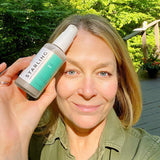Growing up, my family shared meals, stories and jokes. Another thing we had in common wasn't as fun: Acne. My sisters, my mom, and I were all plagued with cystic acne.
Back then, I thought acne was like dental braces — something bothersome that you grew out of eventually. I was wrong. In my 40s I still suffered from acne and the self-conscious dread that comes with it. During one office visit, my dermatologist tried to cheer me up. “Don’t worry ... you won’t age quickly,” he said, noting the theory that acne-prone skin stays younger due to excess oil.
A few years ago, I turned 50 and thought acne would finally subside. Nope, I’m still breaking out.
Turns out adult acne is increasingly more common for women these days. If you are between ages 30-39, you have a 35% chance of having acne. Among women ages 40-49, 25% have acne. Also noteworthy: 50 million people in the U.S. experience acne symptoms year round. That’s a staggering number!

Noticed an uptick in your acne issues lately? Acne also appears to be increasing in frequency due to mask-wearing during the coronavirus pandemic. Say what? Yes, it’s possible your face mask may be causing bouts of acne on your chin and around your mouth and cheeks. A tight fabric mask doesn’t allow your skin to breathe very well and can cause clogged pores, especially if you are wearing makeup while out and about. Masks breed sweat and germs ... even more so if you reuse your mask. It is also possible that the uptick in acne is related to the increased stress and loneliness of isolation.
Since June is Acne Awareness Month, let us help you navigate acne flareups (either occasional or frequent) with some tips:
- Don’t touch your face.
- Keep a regular skincare routine once you find one that works for you. Getting lazy is your enemy. Don’t go to bed without washing your face; unless that works for you. Keep on a skincare schedule.
- On the flip side, if you’re bored and motivated to do more skincare treatments just because, don’t. You want to keep your skin's natural barrier happy and calm. Daily masques, exfoliation and extra drying measures will just upset your skin more.
- Stay calm. Meditate. Stress and anxiety are acne portals for your face. Stressful situations make your body produce cortisol (the stress hormone), which in turn makes your skin overproduce oil, clogging pores and causing inflammation. Hello pimples.
- Exercise. It helps moderate your hormone levels.
- Change your pillow case frequently.
- Diet changes can be successful in combating acne. Eliminate sugar, dairy and refined carbs to help lower your body’s inflammatory response.
How to combat the acne caused by a face mask? That may be a bit easier. If acne is not the norm for you, try these tips to help clear it up:
- Wash your mask after every use. Make sure you have multiples on hand, so you're not doing laundry every day.
- Make sure the fabric is as breathable as possible.
- Don’t wear makeup (if possible), when wearing the mask.
- Exfoliate gently, and maybe a bit more than usual.
Now here is the tricky part. There is no one-size-fits-all routine for acne. If you suffer from acne, you need to find what works best for your skin. Listen to your skin through this process. If something doesn’t feel right, breaks you out or makes your skin look lifeless after use, it isn’t right for your skin. This selection process may take time and many iterations before you find what works. Don’t give up. Once you find the right routine, you’ll enjoy the rewards! Here are a few guidelines you may find helpful:
Cleanse gently. Use a natural cleanser — ideally, one that helps keep your skin barrier in place and doesn’t strip it of natural oils. Some may find a double-cleanse routine helpful in removing oil and makeup more efficiently — employing an oil-based cleanser first, followed by a foaming cleanser. Sounds counter-intuitive but is actually the best method to remove potentially pore-clogging debris. For both cleansing products, you should choose a gentle formulation that's created to lower inflammation, has astringent properties, and can be slightly exfoliating — none of those scrubbing beads, please! Starling's double-cleanse routine might be exactly what your skin needs.

Next step: If you have excessively oily skin, use a gentle, alcohol-free toner to help regulate your pores' oil production. A plant-based toner will take care of your skin’s needs and still be gentle. Starling Super Boost is a hybrid serum that will tone skin and boost its moisture levels.

A light corrective serum is always a good idea for acne-prone skin. Pick one that keeps skin hydrated, assures cellular turnover, and lightens acne scars. Our plant-based Revive Serum can be also be used as a topical serum to help do exactly this for acne-prone skin.

Last step: Make sure you moisturize. Even oily skin and acne-prone skin needs a daily moisturizer. Why? Because skin that is dry will try to compensate by producing more oil. If you regulate your moisture levels, your skin will lighten up on the oil production. Just choose a moisturizer that is not heavy in pore-clogging oils. One that is hydrating and formulated with non-clogging oils. Grape Seed, Jojoba and Rose Hip Seed oils are non-clogging and are effective for sensitive and acne-prone skin. Be aware: coconut oil is a definite no-no if you have acne. It’s highly pore-clogging. So is Shea Butter, so be careful and skip any formulas that include it. Starling is now working on its first moisturizer, so stay tuned.





